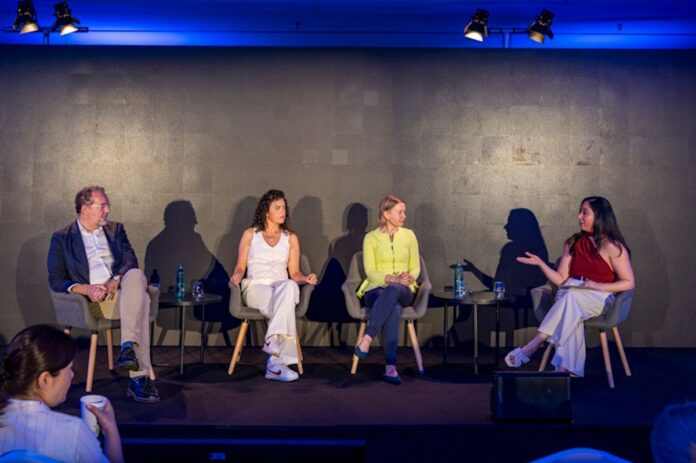Overtourism and sustainability are inherently linked – and that’s one factor not all travelers understand, according to Phocuswright research.
“It’s really difficult for travelers to understand exactly the impact that their own choices make … and to really connect the issues that they’re seeing maybe on screen or in a newspaper with their own travel plans,” said Sally Davey, CEO and president of Travalyst.
Crowds seem like a halfway solvable problem at surface level; it’s hard to think of anyone who particularly relishes barely catching a glimpse of a tourist attraction while standing among a swarm.
“Crowds are interesting because they irritate people and they’re very noticeable and … you can message around it,” Phocuswright senior research analyst Madeline List said at Phocuswright Europe.
List was leading a panel called “A Win Win for Tourism – Balancing Culture and the Economy Phocuswright Europe,” that included Davey in conversation with Shannon Guihan, chief sustainability officer at The Travel Corporation and head of its not-for-profit organization TreadRight, and Mateu Hernández, director general of the Turisme de Barcelona.
We have to make … relevant information available at scale because otherwise people are just getting more frustrated, more confused and [are] turning away from the issues.
Sally Davey – Travalyst
Overtourism is more nuanced than physical crowding – though density may be one of the first areas for tourism authorities to address.
“What happens in a situation where you have a tourism model that might not be culturally sustainable or economically sustainable?” List asked, questioning whether travelers can tell if they’re not welcome in the eyes of locals.
“I think as a visitor to a place you get the feeling if you’re not welcome,” said Davey. “It’s like being a guest in somebody’s home. You know if you’re welcome there or if you’re not.”
“There’s no chance that travelers don’t understand,” said Guihan of The Travel Corporation, which introduced in 2022 a carbon fund to which its 40 brands contribute to address the company’s sustainability goals and help it transition to net zero by 2050.
The best thing to do, according to Davey, is to share relevant information as travelers consider sustainability more while booking and the role they can play in mitigating the issue of overtourism. And, like others across the space, Davey’s Travalyst is working to prioritize ways to relay that information with travelers, including through ongoing certification efforts.
“We have to make … relevant information available at scale because otherwise people are just getting more frustrated, more confused and [are] turning away from the issues,” said Davey.
But traveler education has a ways to go, according to Guihan, who addressed a challenge she said exists in the current system, which she believes anticipates a “high level of traveler education.”
“Now traveler education is a really complicated thing because, of course, guests are going on vacation and a lot of times sensibilities are left behind and perhaps those manners aren’t always brought with them,” said Guihan. “So it takes a very concerted effort.”
Right now, Guihan said, industry organizations concerned with traveler education when it comes to sustainability are at different levels of distribution. “We all need to be aligned in how we’re communicating to guests. And I think that that’s critical and something that we can really work on.”
Hernández referenced Barcelona’s own status in relation to overtourism and how to manage it. He also believes education for tourists is key.
Subscribe to our newsletter below
“So it’s quite known recently for overtourism,” said Hernández of his home city. “But we also know by experience [in] 2020 that maybe it’s better … some kind of overtourism than zero tourism. … So now, the challenge to manage those crowds is better and … education is critical – is crucial.”
He said visitors should be prepared on how to behave, be educated on local culture, cuisine and more when they opt to book a trip.
“When you’re traveling, you’re investing your income, you’re investing your saving,” said Hernández. “You have to really take care of yourself and educate yourself with information with prescription with other comments, understanding the pleasure of visiting and really with that way you will be having a full experience. If not, you will have a bad experience. That’s what we have to tell people.”
The wide-ranging conversation touched on how to make information accessible to travelers, marketing, incorporating local guidance and more.
Watch the full center stage panel below.
A Win Win for Tourism – Balancing Culture and the Economy Phocuswright Europe
List also shared a presentation centered on the Phocuswright report, “Far From the Madding Crowd? The Truth About Overtourism and Dispersal” at Phocuswright Europe, which can be watched in full below.
Phocuswright Research: Sustainability – Overcoming Overtourism with Madeline List


